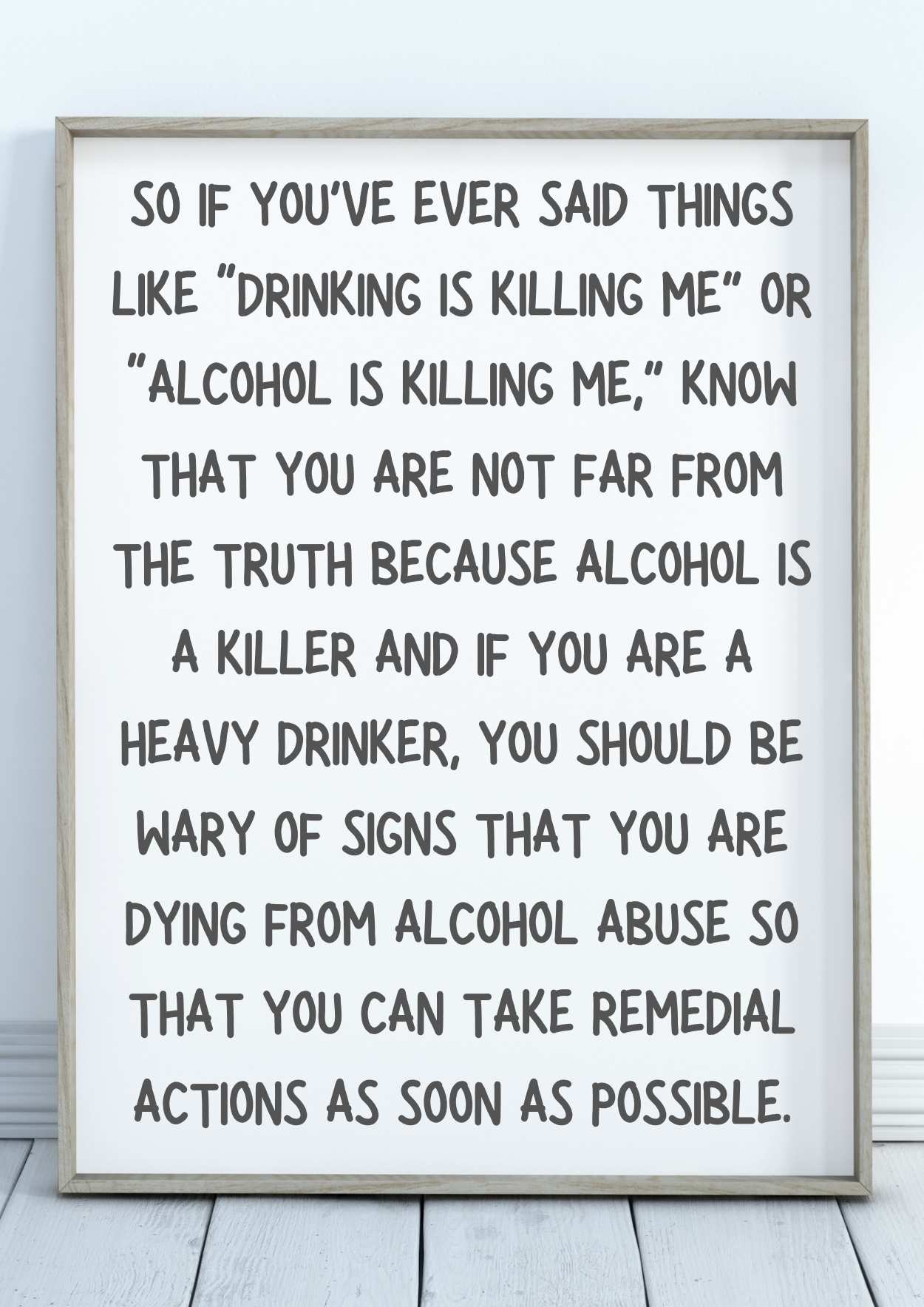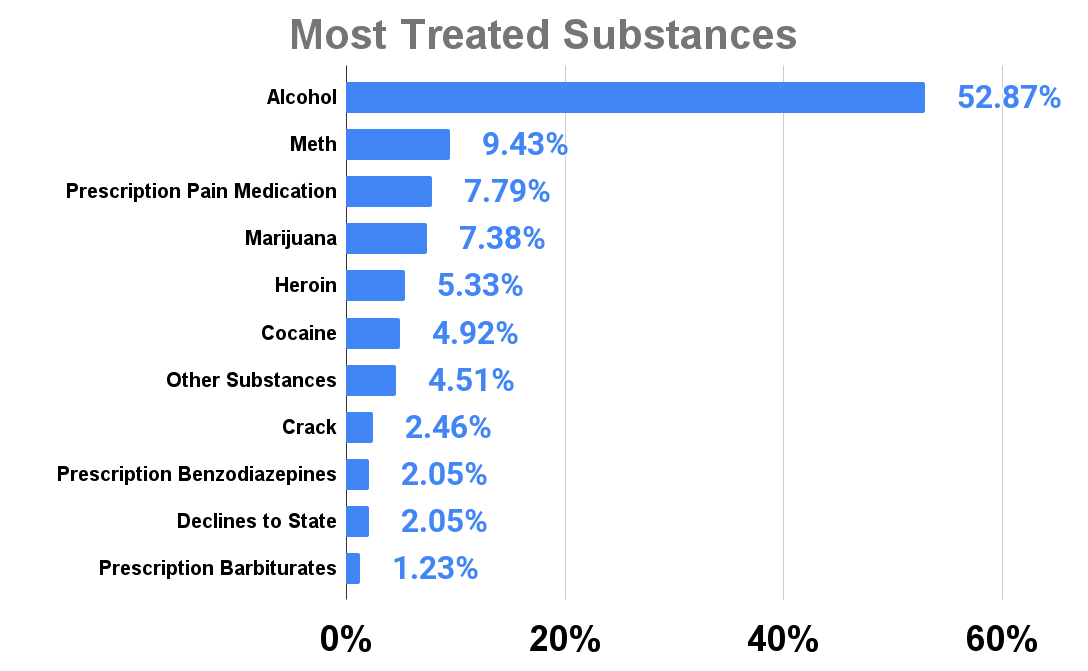11 Signs that Alcohol Is Killing You
WhatToGetMy Instructional Article
- Every year it is estimated that alcohol contributes to the deaths of over 3 million people with men being more affected than women.
- Whilst some of this death is instantaneous such as with car accidents resulting from drunk driving, most of it is as a result of the slow buildup of health problems associated with alcohol.
- Most of these health problems will present signs overtime that should be taken as a wakeup call by those who are consistent and heavy drinkers.
Alcohol is literally poison because it is harmful to living things which is why health professionals generally recommend that people should avoid alcohol as much as they can. Despite this, alcohol is widely consumed due to the temporary “happiness” that it can induce when drunk.
Like everything else, alcohol is only good in moderation but because of the “happiness” that alcohol brings, people tend to abuse it, some without even knowing.
When this is done consistently, the side effects from alcohol will keep building up and lead to a host of diseases and physical conditions that if left unchecked, can lead to a person’s death from alcoholism.
So if you’ve ever said things like “drinking is killing me” or “alcohol is killing me,” know that you are not far from the truth because alcohol is a killer and if you are a heavy drinker, you should be wary of signs that you are dying from alcohol abuse so that you can take remedial actions as soon as possible.

But first, what is a heavy drinker?
The Centre for Disease Control (CDC) defines heavy drinking as Excessive drinking which is when a man takes 15 or more drinks in a week or a woman takes 8 or more drinks in the same time period.
There is also Binge drinking which is when a man takes 5 or more drinks in a single drinking session or a woman takes 4 or more drinks in same.
If you have been excessively or binge drinking on a consistent basis for a long time, you should look out for the signs listed in this article especially if you are aged 45 and above. Bear in mind that these signs could either come individually over time or together as a result of organ failure.
You should therefore take this seriously even if you get one or two signs as opposed to all of them because those signs would just be heralding more serious ones to come.
This article will talk about the physical and mental signs and diseases that could result from taking too much alcohol that you should be wary of. It will also include some advice on what you can do to help you reduce your drinking.
9 Physical signs that alcohol is killing you
1. Liver disease
The liver is the first defence against the harmful effects of alcohol because it is the organ that filters alcohol from the blood. Excessive drinking will damage the liver as it would be unable to keep up with the detoxification which means that it is not a question of “does alcohol kill your liver” but rather “when will alcohol kill your liver?”
The first and least severe disease the liver would suffer would be fatty liver disease which as the term implies, leads to a buildup of fats in the liver. There are no symptoms for this for the most part.
The next level is Liver Hepatitis. Here you will definitely experience some symptoms such as vomiting and jaundice. This disease on its own can cause death if left untreated. The last level is Liver Cirrhosis. At this point the liver is all but doomed because it will be scarred and cannot be healed.
You may not experience signs that your liver is failing until it is too late but it still is a sign that alcohol is killing you because alcohol will always affect the liver so if you are a heavy drinker, know that your liver is in trouble.
2. Cognitive issues
The problem with alcohol is that it gets into the bloodstream and as all organs in the body need blood, they are at risk, including the brain.
Alcohol shrinks the brain if taken over a long period of time because it prevents the brain from being able to create new cells. This will impact brain functions such as memory and reasoning.
There is also the nerve damage that you are at risk of contracting which would lead to nerve pain and numbness as well as tingling in your feet and hands.
3. Heart diseases
It is now a known and proven fact that alcohol can lead to heart diseases and this is even more true for women who drink heavily as opposed to men. As the heart is the central organ in the circulatory system, the system comes under heavy risk as well.
You will have increased exposure to complications such as:
- Stroke
- Cardiac arrest
- Heart failure and,
- Irregular blood flow
Signs that this is already happening are that you will experience high blood pressure and an irregular heartbeat.
Another sign that alcohol is killing you that you will notice is anemia on account of the circulatory system being unable to function efficiently. Symptoms of anemia include pale skin, chest pains and weight loss.
4. Respiratory infections
A major negative side effect from alcohol is that it can affect your lungs and respiratory system. Alcohol makes the lungs more susceptible to lung diseases such as pneumonia and tuberculosis.
If you therefore notice that you are increasingly getting these diseases and you have been drinking excessively, this may be a sign that you are dying from alcoholism.
5. Gastrointestinal and Digestive issues
This is one of the more immediate effects of alcohol because the Gastrointestinal Tract comes into direct contact with alcohol when you first drink it.
Because alcohol is toxic to cells, it irritates the inner lining of the Tract which can cause inflammation which you might feel in the form of heartburn and nausea.
There is no problem with this inflammation in the short term but if you keep drinking excessively, its effects could be exacerbated such that it could damage the internal organs and cause cancer.
6. Pancreatic infections
The pancreas is particularly vulnerable to the effects of alcohol because it leads to it producing more enzymes than it should as well as some toxic material that will lead to it swelling up and getting inflamed.
You will notice this because you will begin to have problems digesting food. The pancreas is also very important in the production of insulin so if it is affected, your insulin levels will be as well and this can lead to diabetes.
7. Cancer
With all the damage that alcohol does to the body, it is virtually impossible that it does not lead to cancer and this has been confirmed by multiple studies and research. For instance, it was estimated that alcohol related cancer killed around 19,000 people in the U.S. in 2009.
Excessive drinking over a long period of time can lead to a variety of cancers including:
- Liver cancer
- Breast cancer
- Intestinal cancer
- Head and neck cancer
- Esophageal cancer
- Colorectal cancer and others
These cancers are much more likely to occur if a person smokes as well because alcohol would make it easier for the cancer causing substances in cigarettes to enter the body and wreak havoc.
8. Increased rate of diseases contraction
Another immediate effect of alcohol as well as a prolonged one, alcohol affects the immune system which makes it many times harder for the body to fight off infections. Studies show that even a day after taking alcohol, your body’s immune system is weaker than it would have been had it not been for the drinking.
Over a prolonged period of excessive drinking, your body’s immune system will suffer heavily and leave you at more risk of being infected. This is the reason the lungs get more easily affected by pneumonia and tuberculosis.
Should you notice that you are getting sicker than you normally do, this could be a sign that your body is experiencing an adverse reaction from alcohol of your immune system suffering damage and you should take steps to stop drinking immediately.
3 Mental signs that alcohol is killing you
9. Dementia and Wernicke–Korsakoff syndrome (WKS)
As mentioned earlier, alcohol damages the brain which can lead to conditions like dementia which is a condition that is characterised by the loss of memory and difficulty in reasoning problem-solving.
Even more serious is Wernicke–Korsakoff syndrome (WKS) which is most commonly caused by alcoholism. WKS comes about when alcohol indirectly leads to the lack of Thiamine and presents itself by giving you symptoms like: lack of muscle coordination, double vision and a confused mental state. You may also experience frequent amnesia and hallucinations.
10. Anxiety and Depression
It is estimated that around 25% of people who drink excessively over a long period of time have psychiatric symptoms such as anxiety and depression.
This is again linked to the effects of alcohol on the brain as alcohol messes with the proper amount of neurotransmitters in the brain. This is particularly dangerous because most alcoholics would then react by taking in more alcohol to numb the anxiety and depression which would then lead to a vicious cycle forming.
So if you have either of these, do not take it likely because it could point to impending brain damage.
Here are ways to help a person with depression.
11. Anti-social behavior
The brain is very important which is why its damage by alcohol leads to a host of things, another of which is antisocial behavior.
Alcohol affects the prefrontal cortex of the brain which is very important in the development and use of social skills. Antisocial behavior like lack of perception and the ability to understand humor would therefore result.
Should you notice these signs, it could point to you having brain damage which is most definitely something you do not want.
6 Ways to reduce your drinking
The good news is, you are not alone in alcoholism. Of the total number of people who seek substance abuse help in a given period, it is estimated that 51% seek help in relation to alcohol misuse and abuse as shown by this graph from ProjectKnow.

There are therefore several treatment avenues available to help you.
1. Target the stress
Most people drink excessively because they have a stressor in their lives. The first step if this is the case is to target this stressor and limit its effect on your life.
By reducing these effects, you will have less stress and will thus have less of a need to drink.
If you need ways to feel better and overcome stress, check how to make yourself feel better when you are down.
2. Rehabilitation
If you find that you are unable to quit on your own, you can check into a rehabilitation center where therapists will be able to help you kick the habit.
It will be tough because detoxification can take a toll on you physically but you need to push through it because the benefits will outweigh the cost.
Rehab will also teach you strategies on how to cope with alcoholism so that when you get out, you can continue your progress.
3. Group therapy
There are also groups such as Alcoholics Anonymous (AA) who help people get over alcohol abuse by talking it out with others who are going through the same thing as well as offering much needed moral support.
Some people prefer to skip rehab and go straight to these groups but the effectiveness of doing that is questionable so it is recommended that one go to rehab – if unable to quit on your own – before going for group therapy.
4. Psychotherapy
This is therapy with the help of a licensed mental health professional such as a psychiatrist or a psychologist.
They are very equipped to help you because they use techniques that are tried and tested and have been known to help people get over alcoholism. They usually work by helping you find the source of the excessive drinking and then working with you to overcome them.
5. Take care of yourself
Regardless of if you manage to kick the habit or not, you should definitely try to take better care of yourself by exercising and eating healthy.
For those who still decide to drink, this would reduce the damage to the organs and for those who kick the habit completely, you will not only be able to reduce the damage, you will begin to recover as well.
Check out tips on protecting your health and foods to eat to maintain a healthy lifestyle.
6. Seek medical help
This is perhaps most important because your health is at stake. If you notice any of the signs described in this article, you should see a doctor as soon as you can.
Not only will they help you with the various health problems that you may be experiencing, they can also give you medication that will help ease you through the withdrawal process.
It is therefore paramount that you see a doctor if you notice any of these signs and also if you are a heavy drinker who wants to quit on your own.
Frequently Asked Questions
1. How do alcoholics die suddenly?
There are several things that can kill a chronic drinker such as:
- Diseases
- Alcohol poisoning
- Health conditions such as liver failure and heart complications.
The problem is that it can be tough to pinpoint exactly what killed an alcoholic as alcohol affects so many organs in the body.
2. What is the average age of death for alcoholics?
Alcoholics who started excessively drinking early in life are generally not expected to live past 53 years for men and 58 years for women.
And although it cannot be said for certain how long it takes for alcohol to kill one, it is estimated that alcoholics will see around 20 years shaved off of their lives as a result of heavy drinking for a sustained period of time.
3. What does alcohol damage feel like?
Alcohol affects many organs in the body so the damage it causes can be felt in several ways such as:
- A tingling sensation from nerve damage
- Increased rate of disease contraction from a weakened immune system
- Digestion problems from gastrointestinal damage
- Diabetes from damage to the pancreas
- Cognitive issues such as dementia on account on brain damage
- Respiratory illnesses such as pneumonia
Conclusion
Can alcoholism kill you? It most certainly can.
Multiple studies have shown that alcohol has and continues to kill millions because it is toxic to the human body and while there are sometimes signs that show you that alcohol is damaging your systems, this is not always the case.
You should therefore always assume that as a chronic drinker, alcohol is most definitely wreaking havoc in your body and take action against it in order to avoid becoming a statistic.
01 HOUR 32 MINUTES
ESTIMATED TIME DESIGNING AND UPLOADING THIS ARTICLE
09 HOURS 53 MINUTES
ESTIMATED TIME RESEARCHING AND WRITING THIS ARTICLE
You Might Also Like


